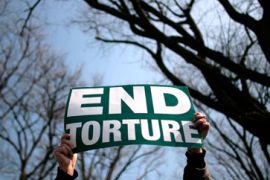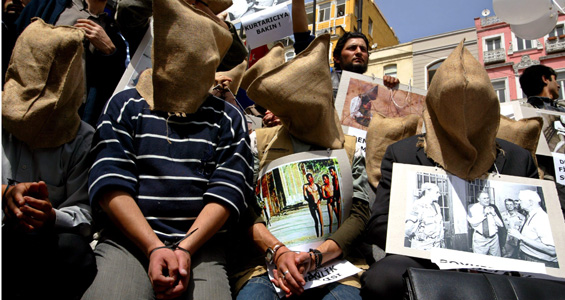Britain’s ‘wall of secrecy’
Report calls for inquiry into accusations the British government was ‘complicit in torture’.

 |
| Britain has been accused of working with foreign intelligence agencies that use torture [EPA] |
Torture is a powerful word. It conjures up graphic images of abuse that until relatively recently, most British people were more likely to associate with history books or despotic regimes than the government they elected to lead them.
No longer. A cross-party human rights committee from both houses of parliament – the Commons and the Lords – has published a damning report that calls for an independent inquiry into what it describes as the “disturbing number of credible allegations of UK complicity in torture”.
No one is suggesting that British intelligence agents tortured anyone themselves. Instead, they are accused of working with foreign agencies known to use torture in their interrogations, such as Pakistan’s ISI.
They are said to have effectively condoned detainee abuse by looking the other way when they encountered it, and using the intelligence gathered regardless.
In recent months Britain has been accused of arranging the arrests of terrorism suspects by torturing regimes, providing lists of interrogation questions to unscrupulous foreign intelligence services, and of sending agents to question prisoners that they knew were being tortured by their captors. And that, the report says, is illegal.
Traumatised
Take the case of Binyam Mohamed, an Ethiopian who claimed asylum in Britain during the 1990s. Arrested in Pakistan in 2002 and accused of involvement in terrorism, Mohamed was plunged into the dark world of the CIA’s extraordinary rendition programme for more than two years, before surfacing, traumatised and carrying the scars of his abuse, in Guantanamo Bay in 2004.
 |
| Binyam Mohamed said he was tortured and abused by foreign agents while in Pakistan |
He was not released until earlier this year and is currently fighting a high profile legal action against the British government aimed at forcing disclosure of what they knew of his detention and torture.
During the missing two years, Mohamed was held in Pakistan, where a British intelligence officer questioned him.
He was then flown to Morocco, where he says he was subjected to unspeakable abuse involving a razor blade and his genitals, before being taken to Afghanistan, where his torture continued.
During his time in Morocco, he says he was asked questions that could only have come from the British intelligence services.
Unanswered questions
Britain denies knowing his whereabouts during this period, but a growing list of unanswered questions has undermined this claim.
How did the Moroccans gather detailed information about his life in the UK if the British did not provide them? Why did the British intelligence officer who visited Mohamed in Pakistan travel to Morocco on at least three occasions while he was being held there? And why is the British government fighting the release of seven paragraphs of information that apparently confirm that the US knew what was happening to Mohamed? Could it be that they knew too?
The problem, from the point of view of the committee, is that the government is doing everything it can to leave these questions, and many others like them, unanswered.
Rather than release relevant information in the face of specific allegations, ministers continue to repeat the official government line that Britain does not condone torture under any circumstances.
Any further details, they say, would endanger national security. The claim has led some to suspect the government is deliberately conflating national security with national shame.
“General assertions of non-complicity are no longer an adequate response to the many detailed allegations,” the chairman of committee, Labour MP Andrew Dismore says.
“An independent inquiry is the only way to get to the bottom of these stories, clear the air and make recommendations for the future conduct and management of the security services.”
Hidden involvement
The report says that the systems in place to hold senior politicians to account on the issue are “woefully deficient”.
Now that the number of credible reports of Britain’s hand in cases where torture was used has reached a critical mass, the committee say the rules governing accountability should be changed.
The report details how, during the investigation, attempts to call senior intelligence officials to give evidence to parliamentarians were refused. Meanwhile, the government ministers behind the policies in question have, in many cases, simply refused to answer the questions raised by the allegations.
“None of the existing accountability mechanisms have come anywhere close to answering the questions raised or ensuring the relevant information is placed in the public domain,” the report bluntly states.
But what is the relevant information? Amongst other things, the committee demands to know whether there was a policy change with regard to treatment of prisoners of foreign intelligence services after the September 11 attacks, who authorised it and upon what legal advice it was based.
These are difficult questions for the government to answer, especially if, as the growing body of evidence suggests, guidelines were altered in a misguided attempt to improve the UK’s intelligence gathering capabilities. But lawyers acting on behalf of the victims say that if the law has been broken, then the government should not be allowed to conceal evidence under the pretence of national security.
“Sadly, this report shows how our government is using secrecy and deliberate evasion to place themselves above the law,” says Clive Stafford Smith, the director of the British legal charity Reprieve.
“Colluding in, or failing to report, torture is a crime; if you or I were to do it we would be rightly hauled before a court. The same should be true of government.”
The British government is under no obligation to follow the recommendations detailed in the report. But it comes at a time when ministers find themselves under increasing pressure to clarify their recent policies, and the growing outcry in Britain over the allegations could force them to act.
It is clear is that the British government has hidden its true position on torture behind what the committee calls a “wall of secrecy”. The publication of the report has struck a blow against this wall and in coming months many will be hoping to see it fall, whatever it may have lurking behind it.
Andrew Wander is a Reprieve Media Fellow working on Al Jazeera’s Public Liberties and Human Rights Desk. Reprieve is a legal charity based in London that represents more than 30 prisoners in Guantánamo Bay and investigates US secret prisons worldwide.